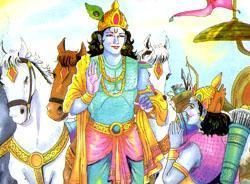|
|
| Kurukshetra and After |

The day of the battle dawned bright and clear. The banners and pennants of kings and chieftains fluttered gaily in the sunshine. The air was resonant with the fearsome sounds of the battle ground.
The two armies stood facing each other on the plains of Kurukshetra. Krishna was Arjuna's charioteer. Arjuna said to Krishna, "O Krishna, drive the chariot between the two armies so that I may see the warriors arrayed against us." Krishna accordingly drove the chariot and stationed it between the opposing forces.
Arjuna saw friends and relatives, the highly respected guru Drona, granduncle Bhishma and others who stood ready for battle. He was overcome with sorrow and, turning to Krishna, said, "O Krishna, I am greatly agitated. My limbs are trembling and my mouth is dry. Can there be any happiness for me after killing my own relatives? Our guru Drona and grandfather Bhishma are worthy of worship. Am I to kill them for the sake of kingdom? No, I will not raise my hand against them even for the kingship of three worlds! I am sorry but I shall not fight." Saying this Arjuna threw away his weapons and sank low in utter dejection.
Krishna listened to Arjuna with compassion. He saw how the blood had drained from the hero's face, and how he trembled. He offered wise and gentle words of advice to his friend on the duties at the time of battle, encouraging him. For he knew that it was too late now to withdraw from the conflict. The Pandavas had committed themselves, and they must fight to the very end.
So Krishna spoke to Arjuna of life and death, of this world and the other, of the struggles and conflicts and sorrows of mankind, and the three paths by which men may reach God-for all may reach God, no matter who or what they were. The three paths were the path of meditation and yoga, that of duty and of the love of God. Each man, might choose his own path the God, but for the Kshatriya, as for most of the people, the way to God lay in the path of duty.
Finally, Krishna spoke to Arjuna of the only limitless God that all men seek. "I will speak to you of my divine forms," he said, "but only of those which are the most important, for I am infinite. I am the beginning, the middle and the end-of everything. I am birth and the beginning of all things; I am death, which is the end. I am eternal, for I was never born; neither will I ever die. I exist everywhere and in all things, and all things exist in Me. There is nothing moving or unmoving that can exist without Me! Do your duty and leave the rest to me."
Krishna's words found their mark. Arjuna rose and, folding his hands said, "Please forgive me for what I said. I am now ready for battle." And, lifting his Gandiva, he pulled the string to produce a mighty sound.
The two armies advanced and clashed like thunderclouds, and the skies reverberated with the sound. Arrows flew through the air like shooting stars. Old ties were forgotten and fathers and sons, uncles and nephews killed each other in the terrible blood-bath. | |
|